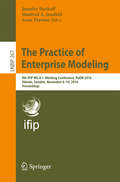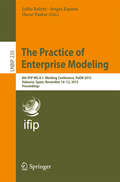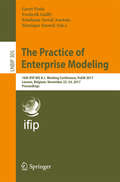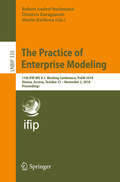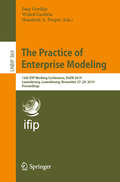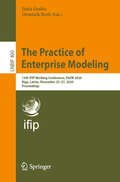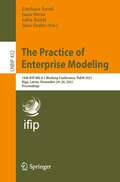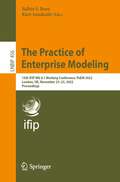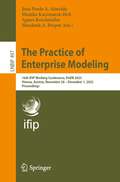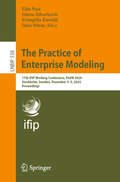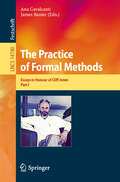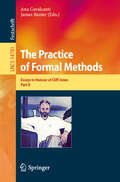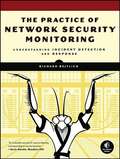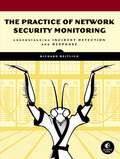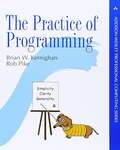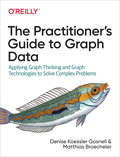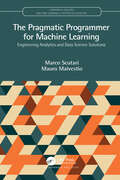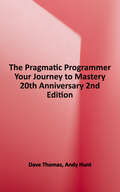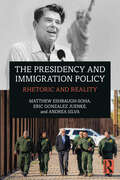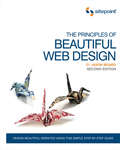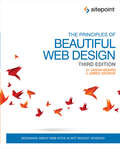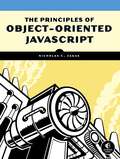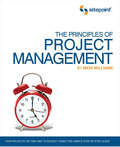- Table View
- List View
The Practice of Enterprise Modeling
by Anne Persson Manfred A. Jeusfeld Jennifer HorkoffEnterprise modeling (EM) has gained substantial popularity both in the academic community and among practitioners. A variety of EM methods, approaches, and tools are developed and offered on the market. In practice they are used for various p- poses such as business strategy development, process restructuring, as well as business and IT architecture alignment and governance. PoEM 2008, the First IFIP WG 8. 1 Working Conference on The Practice of Ent- prise Modeling, took place in Stockholm, Sweden. It is the first conference aiming to establish a dedicated forum where the use of EM in practice is addressed by bringing together researchers, users, and practitioners. The goals of PoEM 2008 were to - velop a better understanding of the practice of EM, to contribute to improved EM practice, as well as to share knowledge and experiences. The theme of PoEM 2008 was EM in different application contexts, e. g. , software development, including agile development, as well as business development, gove- ance, and change.
The Practice of Enterprise Modeling
by Jolita Ralyté Sergio España Óscar PastorThis volume constitutes the proceedings of the 8th IFIP WG 8. 1 Conference on the Practice of Enterprise Modeling held in November 2015 in Valencia, Spain. The PoEM conference series started in 2008 and aims to provide a forum sharing knowledge and experiences between the academic community and practitioners from industry and the public sector. The 23 short papers accepted were carefully reviewed and selected from 72 submissions and are organized in eight sections on Evolving Enterprises, Securing Enterprises, Making Empirical Studies, Investigating Enterprise Methods, Acquiring User Information, Managing Risks and Threats, Engineering Methods, and Making Decisions in Enterprises.
The Practice of Enterprise Modeling: 10th IFIP WG 8.1. Working Conference, PoEM 2017, Leuven, Belgium, November 22-24, 2017, Proceedings (Lecture Notes in Business Information Processing #305)
by Geert Poels, Frederik Gailly, Estefania Serral Asensio and Monique SnoeckThis volume constitutes the proceedings of the 10th IFIP WG 8.1 Conference on the Practice of Enterprise Modeling held in November 2017 in Leuven, Belgium. The conference was created by the International Federation for Information Processing (IFIP) Working Group 8.1 to offer a forum for knowledge transfer and experience sharing between the academic and practitioner communities. The 20 full papers and 4 short papers accepted were carefully reviewed and selected from 70 submissions. They include research results, practitioner/experience reports and work-in-progress papers and were presented in 8 sessions covering diverse topics related to enterprise modelling and its application in practice.
The Practice of Enterprise Modeling: 11th IFIP WG 8.1. Working Conference, PoEM 2018, Vienna, Austria, October 31 – November 2, 2018, Proceedings (Lecture Notes in Business Information Processing #335)
by Robert Andrei Buchmann Dimitris Karagiannis Marite KirikovaThis volume constitutes the proceedings of the 11th IFIP WG 8.1 Conference on the Practice of Enterprise Modeling held in October/November 12018 in Vienna, Austria. The conference was created by the International Federation for Information Processing (IFIP) Working Group 8.1 to offer a forum for knowledge transfer and experience sharing between the academic and practitioner communities.The 21 full papers and 5 short papers accepted were carefully reviewed and selected from 64 submissions. They are grouped by the following topics: business process modeling, model derivation; collaboration modeling; reviews and analyses of modeling methods; semantics and reasoning, experience reports; and teaching challenges.
The Practice of Enterprise Modeling: 12th IFIP Working Conference, PoEM 2019, Luxembourg, Luxembourg, November 27–29, 2019, Proceedings (Lecture Notes in Business Information Processing #369)
by Wided Guédria Henderik A. Proper Jaap GordijnThis volume constitutes the proceedings of the 12th IFIP WG 8.1 Conference on the Practice of Enterprise Modeling held in November 2019 in Luxembourg, Luxembourg. The conference was created by the International Federation for Information Processing (IFIP) Working Group 8.1 to offer a forum for knowledge transfer and experience sharing between the academic and practitioner communities. The 15 full papers accepted were carefully reviewed and selected from 35 submissions. They are grouped by the following topics: modeling and ontologies; reference architectures and patterns; methods for architectures and models; and enterprise architecture for security, privacy and compliance.
The Practice of Enterprise Modeling: 13th IFIP Working Conference, PoEM 2020, Riga, Latvia, November 25–27, 2020, Proceedings (Lecture Notes in Business Information Processing #400)
by Jānis Grabis Dominik BorkThis book constitutes the proceedings papers of the 13th IFIP Working Conference on the Practice of Enterprise Modeling, held in Riga, Latvia, in November 2020. Due to the COVID-19 pandemic the conference took place virtually. The 19 full papers presented together with 7 short and 2 invited papers in this volume were carefully reviewed and selected from a total of 58 submissions to the main conference. The special focus of PoEM 2020 is on the role of enterprise modelling in the digital age. The selected papers are grouped by the following topics: Enterprise Modeling and Enterprise Architecture, Formal Aspects of Enterprise Modelling, Foundations and Applications of Enterprise Modeling, Enterprise Ontologies, Business Process Modeling, Risk and Security Modeling, Requirements Modeling, and Process Mining.
The Practice of Enterprise Modeling: 14th IFIP WG 8.1 Working Conference, PoEM 2021, Riga, Latvia, November 24–26, 2021, Proceedings (Lecture Notes in Business Information Processing #432)
by Jolita Ralyté Janis Stirna Jānis Grabis Estefanía SerralThis book constitutes the proceedings papers of the 14th IFIP Working Conference on the Practice of Enterprise Modeling, held in Riga, Latvia, during November 24-26, 2021. PoEM offers a forum for sharing experiences and knowledge between the academic community and practitioners from industry and the public sector. This year the theme of the conference is the use of enterprise modeling and enterprise architecture towards ensuring sustainability and resilience of enterprises and societies. The 14 full and 6 short papers presented in this volume were carefully reviewed and selected from a total of 47 submissions. They were organized in topical sections named: enterprise modeling and enterprise architecture; enterprise modeling methods and method engineering; business process modeling and management; requirements engineering for privacy, security and governance; and case studies and experiences.
The Practice of Enterprise Modeling: 15th IFIP WG 8.1 Working Conference, PoEM 2022, London, UK, November 23–25, 2022, Proceedings (Lecture Notes in Business Information Processing #456)
by Kurt Sandkuhl Balbir S. BarnThis book constitutes the proceedings of the 15th IFIP Working Conference on the Practice of Enterprise Modeling, PoEM 2022, which took place in London, UK, during November 23-25, 2022. PoEM offers a forum for sharing experiences and knowledge between the academic community and practitioners from industry and the public sector. This year the theme of the conference is Enterprise Modeling and Model-based Development and Engineering. The 15 full papers presented in this volume were carefully reviewed and selected from a total of 45 submissions. They were organized in topical sections as follows: models in information system development; modeling enterprise architectures; modeling capabilities and ecosystems; DSML and meta-modeling; and participatory modeling.
The Practice of Enterprise Modeling: 16th IFIP Working Conference, PoEM 2023, Vienna, Austria, November 28 – December 1, 2023, Proceedings (Lecture Notes in Business Information Processing #497)
by Henderik A. Proper Agnes Koschmider João Paulo A. Almeida Monika Kaczmarek-HeßThis book constitutes the proceedings of the 16th IFIP Working Conference on the Practice of Enterprise Modeling, PoEM 2023, which took place in Vienna, Austria, during November 28 - December 1, 2023. PoEM offers a forum for sharing experiences and knowledge between the academic community and practitioners from industry and the public sector. This year the theme of the conference is Enterprise Modeling in the Circular Economy. The 12 full papers presented in this volume were carefully reviewed and selected from a total of 34 submissions. They were organized in topical sections named as follows: Enterprise modeling and artificial intelligence; emerging architectures and digital transformation; modeling tools and approaches; and enterprise modeling at work.
The Practice of Enterprise Modeling: 17th IFIP Working Conference, PoEM 2024, Stockholm, Sweden, December 3–5, 2024, Proceedings (Lecture Notes in Business Information Processing #538)
by Janis Stirna Jelena Zdravkovic Elda Paja Evangelia KavakliThis book constitutes the proceedings of the 17th IFIP Working Conference on the Practice of Enterprise Modeling, PoEM 2024, which took place in Stockholm, Sweden, during December 3-5, 2024. PoEM offers a forum for sharing experiences and knowledge between the academic community and practitioners from industry and the public sector. This year the theme of the conference is Industry 5.0 and Society 5.0. The 17 full papers presented in this volume were carefully reviewed and selected from a total of 48 submissions. They were organized in topical sections named as follows: Enterprise modeling for digital transformation and industry applications; advances in enterprise modelling techniques; process mining and business process analysis; security, compliance, and configuration in enterprise modeling.
The Practice of Enterprise Modeling: 9th IFIP WG 8.1. Working Conference, PoEM 2016, Skövde, Sweden, November 8-10, 2016, Proceedings (Lecture Notes in Business Information Processing #267)
by Jennifer Horkoff, Manfred A. Jeusfeld and Anne PerssonThis volume constitutes the proceedings of the 9th IFIP WG 8.1 Conference on the Practice of Enterprise Modeling held in November 2016 in Skövde, Sweden. The PoEM conference series started in 2008 and aims to provide a forum sharing knowledge and experiences between the academic community and practitioners from industry and the public sector. The 18 full papers and 9 short papers accepted were carefully reviewed and selected from 54 submissions and cover topics related to information systems development, enterprise modeling, requirements engineering, and process management. In addition, the keynote by Robert Winter on “Establishing 'Architectural Thinking' in Organizations” is also included in this volume.
The Practice of Formal Methods: Essays in Honour of Cliff Jones, Part I (Lecture Notes in Computer Science #14780)
by Ana Cavalcanti James BaxterThis Festschrift, dedicated to Cliff Jones, contains papers written by many of his closest collaborators. Cliff has an exceptional international standing for his groundbreaking research and leadership within the practice of formal methods, his career encompasses significant contributions to academia, industry, policy, and service. Cliff is a Fellow of the Royal Academy of Engineering, ACM, BCS, and IET, and in 2015 he was the inaugural Fellow of the Formal Methods Europe association. His career has included industry research in the UK, Austria and Belgium, a PhD at the University of Oxford, and academic and research roles at the University of Cambridge and the University of Manchester, and since 1999 at Newcastle University. Throughout his career, he has championed the essential role of formalism in design processes. His collaboration at IBM in the 1970s led to the creation of the Vienna Development Method (VDM), a seminal contribution that has influenced both practical industry applications and theoretical advancements. Cliff was the founding editor of the ACM journal Formal Aspects of Computing, a founder of the Formal Methods symposium, and he played a pivotal role in the IFIP Working Groups on Programming Methodology and Verified Software. His policy advocacy has been instrumental in fostering public discourse on the reliability of computing systems. The 30 contributions in this volume are a snapshot of the many current scientific developments inspired by or built upon Cliff’s contributions.
The Practice of Formal Methods: Essays in Honour of Cliff Jones, Part II (Lecture Notes in Computer Science #14781)
by Ana Cavalcanti James BaxterThis Festschrift, dedicated to Cliff Jones, contains papers written by many of his closest collaborators. Cliff has an exceptional international standing for his groundbreaking research and leadership within the practice of formal methods, his career encompasses significant contributions to academia, industry, policy, and service. Cliff is a Fellow of the Royal Academy of Engineering, ACM, BCS, and IET, and in 2015 he was the inaugural Fellow of the Formal Methods Europe association. His career has included industry research in the UK, Austria and Belgium, a PhD at the University of Oxford, and academic and research roles at the University of Cambridge and the University of Manchester, and since 1999 at Newcastle University. Throughout his career, he has championed the essential role of formalism in design processes. His collaboration at IBM in the 1970s led to the creation of the Vienna Development Method (VDM), a seminal contribution that has influenced both practical industry applications and theoretical advancements. Cliff was the founding editor of the ACM journal Formal Aspects of Computing, a founder of the Formal Methods symposium, and he played a pivotal role in the IFIP Working Groups on Programming Methodology and Verified Software. His policy advocacy has been instrumental in fostering public discourse on the reliability of computing systems. The 30 contributions in this volume are a snapshot of the many current scientific developments inspired by or built upon Cliff’s contributions.
The Practice of Network Security Monitoring: Understanding Incident Detection and Response
by Richard BejtlichNetwork security is not simply about building impenetrable walls -- determined attackers will eventually overcome traditional defenses. The most effective computer security strategies integrate network security monitoring (NSM): the collection and analysis of data to help you detect and respond to intrusions. In The Practice of Network Security Monitoring, Mandiant CSO Richard Bejtlich shows you how to use NSM to add a robust layer of protection around your networks -- no prior experience required. To help you avoid costly and inflexible solutions, he teaches you how to deploy, build, and run an NSM operation using open source software and vendor-neutral tools. You'll learn how to: Determine where to deploy NSM platforms, and size them for the monitored networks Deploy stand-alone or distributed NSM installations Use command line and graphical packet analysis tools, and NSM consoles Interpret network evidence from server-side and client-side intrusions Integrate threat intelligence into NSM software to identify sophisticated adversaries There's no foolproof way to keep attackers out of your network. But when they get in, you'll be prepared. The Practice of Network Security Monitoring will show you how to build a security net to detect, contain, and control them. Attacks are inevitable, but losing sensitive data shouldn't be.
The Practice of Network Security Monitoring: Understanding Incident Detection and Response
by Richard BejtlichNetwork security is not simply about building impenetrable walls—determined attackers will eventually overcome traditional defenses. The most effective computer security strategies integrate network security monitoring (NSM): the collection and analysis of data to help you detect and respond to intrusions.In The Practice of Network Security Monitoring, Mandiant CSO Richard Bejtlich shows you how to use NSM to add a robust layer of protection around your networks—no prior experience required. To help you avoid costly and inflexible solutions, he teaches you how to deploy, build, and run an NSM operation using open source software and vendor-neutral tools.You'll learn how to:–Determine where to deploy NSM platforms, and size them for the monitored networks–Deploy stand-alone or distributed NSM installations–Use command line and graphical packet analysis tools, and NSM consoles–Interpret network evidence from server-side and client-side intrusions–Integrate threat intelligence into NSM software to identify sophisticated adversariesThere’s no foolproof way to keep attackers out of your network. But when they get in, you’ll be prepared. The Practice of Network Security Monitoring will show you how to build a security net to detect, contain, and control them. Attacks are inevitable, but losing sensitive data shouldn't be.
The Practice of Programming
by Brian W. Kernighan Rob PikeWith the same insight and authority that made their book The Unix Programming Environment a classic, Brian Kernighan and Rob Pike have written The Practice of Programming to help make individual programmers more effective and productive. <P><P> The practice of programming is more than just writing code. Programmers must also assess tradeoffs, choose among design alternatives, debug and test, improve performance, and maintain software written by themselves and others. At the same time, they must be concerned with issues like compatibility, robustness, and reliability, while meeting specifications. <P><P> The Practice of Programming covers all these topics, and more. This book is full of practical advice and real-world examples in C, C++, Java, and a variety of special-purpose languages. It includes chapters on: <P><P> <P>• debugging: finding bugs quickly and methodically <P>• testing: guaranteeing that software works correctly and reliably <P>• performance: making programs faster and more compact <P>• portability: ensuring that programs run everywhere without change <P>• design: balancing goals and constraints to decide which algorithms and data structures are best <P>• interfaces: using abstraction and information hiding to control the interactions between components <P>• style: writing code that works well and is a pleasure to read <P>• notation: choosing languages and tools that let the machine do more of the work <P><P> Kernighan and Pike have distilled years of experience writing programs, teaching, and working with other programmers to create this book. Anyone who writes software will profit from the principles and guidance in The Practice of Programming.
The Practitioner's Guide to Graph Data: Applying Graph Thinking and Graph Technologies to Solve Complex Problems
by Denise Gosnell Matthias BroechelerGraph data closes the gap between the way humans and computers view the world. While computers rely on static rows and columns of data, people navigate and reason about life through relationships. This practical guide demonstrates how graph data brings these two approaches together. By working with concepts from graph theory, database schema, distributed systems, and data analysis, you’ll arrive at a unique intersection known as graph thinking.Authors Denise Koessler Gosnell and Matthias Broecheler show data engineers, data scientists, and data analysts how to solve complex problems with graph databases. You’ll explore templates for building with graph technology, along with examples that demonstrate how teams think about graph data within an application.Build an example application architecture with relational and graph technologiesUse graph technology to build a Customer 360 application, the most popular graph data pattern todayDive into hierarchical data and troubleshoot a new paradigm that comes from working with graph dataFind paths in graph data and learn why your trust in different paths motivates and informs your preferencesUse collaborative filtering to design a Netflix-inspired recommendation system
The Pragmatic Programmer for Machine Learning: Engineering Analytics and Data Science Solutions (Chapman And Hall/crc Machine Learning And Pattern Recognition Ser.)
by Marco Scutari Mauro MalvestioMachine learning has redefined the way we work with data and is increasingly becoming an indispensable part of everyday life. The Pragmatic Programmer for Machine Learning: Engineering Analytics and Data Science Solutions discusses how modern software engineering practices are part of this revolution both conceptually and in practical applictions. Comprising a broad overview of how to design machine learning pipelines as well as the state-of-the-art tools we use to make them, this book provides a multi-disciplinary view of how traditional software engineering can be adapted to and integrated with the workflows of domain experts and probabilistic models. From choosing the right hardware to designing effective pipelines architectures and adopting software development best practices, this guide will appeal to machine learning and data science specialists, whilst also laying out key high-level principlesin a way that is approachable for students of computer science and aspiring programmers.
The Pragmatic Programmer: Your Journey To Mastery, 20th Anniversary Edition
by David Thomas Andrew HuntFor twenty years, the lessons from The Pragmatic Programmer have helped a generation of programmers examine the very essence of software development, independent of any particular language, framework, or methodology. This classic title is regularly featured on “Top Ten” lists, and many corporations issue it to their new hires. This new 20th Anniversary Edition offers a fresh look at the modern development landscape, cutting through the “business as usual” and tired advice from the net to help guide you through the next twenty years and beyond. Featuring new tips, new topics, and revisions throughout, you don’t want to miss this one. Published by Addison Wesley by special arrangement with the Pragmatic Bookshelf.
The Presidency and Immigration Policy: Rhetoric and Reality
by Matthew Eshbaugh-Soha Eric Gonzalez Juenke Andrea SilvaThis comprehensive analysis of presidential immigration rhetoric quantifies the frequency, tone, and efficacy of public mentions of immigrants and immigration policy by the presidents from Washington through Biden. The book also explores the intersection of the presidential role with that of the other key actors in the immigration policy system—notably the press, the public, and Congress. For students of immigration studies, presidential studies, and political communication, this book also poses the question of which is of the greatest significance to the immigration policy agenda: presidential leadership making immigration a top priority or existing legislative support for comprehensive immigration reform.
The Princess and the Pauper
by Kate BrianCarina, a real European princess, is dying to hook up with the sexy American rock star she met online. Too bad about all those bodyguards watching her every move. Then Carina spots her down-and-out near-twin, Julia. For a fast ten grand, Julia grabs the gown and the crown, and the girls swap identities for a day. Before long Princess Carina is trapped on a sketchy bus full of roadies, and pauper Julia is jetting off to... some small foreign country? Only a storybook ending can get these two poseurs back to where they belong.
The Principles of Beautiful Web Design: 101 Essential Tips, Tricks And Hacks
by Jason BeairdThis second edition of The Principles of Beautiful Web Design is the ideal book for people who can build websites, but are seeking the skills and knowledge to visually enhance their sites.This book will teach you how to:Understand the process of what makes "good design," from discovery through to implementationUse color effectively, develop color schemes, and create a paletteCreate pleasing layouts using grids, the rule of thirds, and symmetryEmploy textures: lines, points, shapes, volumes, and depthApply typography to make ordinary designs look greatChoose, edit, and position effective imageryAnd lots more...This revised, easy-to-follow guide is illustrated with beautiful, full-color examples, and leads readers through the process of creating great designs from start to finish.It also features:Updated information about grid-based designHow to design for mobile resolutionsInformation about the future of web fonts including @font-faceCommon user-interface patterns and resources
The Principles of Beautiful Web Design: Designing Great Web Sites is Not Rocket Science!
by Jason Beaird James GeorgeThe Principles of Beautiful Web Design is the ideal book for people who can build websites, but are seeking the skills and knowledge to visually enhance their sites.This book will teach you how to:Understand what makes "good design," from discovery through to implementationUse color effectively, develop color schemes, and create a paletteCreate pleasing layouts using grids, the rule of thirds, and symmetryEmploy textures: lines, points, shapes, volumes, and depthApply typography to make ordinary designs look greatChoose, edit, and position effective imageryAnd lots more...This easy-to-follow guide is illustrated with beautiful, full-color examples, and will lead you through the process of creating great designs from start to finish. The third edition of this book has been greatly revised and now features:Updated and expanded coverage of mobile and responsive web design (RWD)A new sample projectNew sections on user interface and icon designCommon user-interface patterns and resources
The Principles of Object-Oriented JavaScript
by Nicholas C. Zakas<p>If you've used a more traditional object-oriented language, such as C++ or Java, JavaScript probably doesn't seem object-oriented at all. <p>It has no concept of classes, and you don't even need to define any objects in order to write code. But don't be fooled—JavaScript is an incredibly powerful and expressive object-oriented language that puts many design decisions right into your hands.In The Principles of Object-Oriented JavaScript, Nicholas C. Zakas thoroughly explores JavaScript's object-oriented nature, revealing the language's unique implementation of inheritance and other key characteristics. <p>You'll learn:–The difference between primitive and reference values–What makes JavaScript functions so unique–The various ways to create objects–How to define your own constructors–How to work with and understand prototypes–Inheritance patterns for types and objectsThe Principles of Object-Oriented JavaScript will leave even experienced developers with a deeper understanding of JavaScript. <p>Unlock the secrets behind how objects work in JavaScript so you can write clearer, more flexible, and more efficient code.
The Principles of Project Management (SitePoint (SitePoint (SitePoint (SitePoint: Project Management): Project Management)
by Meri WilliamsThe Principles of Project Management lays out clear steps that anyone can follow to get projects done right, and delivered on time.This full color book covers:Why Project Management is importantThe 6 fundamental truths of project managementGetting started: Discovering, Initiating, Planning and Resourcing a projectGetting the Job Done: Executing and controllingKeeping it Smooth: Communication, collaboration and managing changeFollowing through: Ongoing support and maintenance, measuring operational successResources: Review of various tools, recommended reading, professional resources for project managementShort, and to the point, this book aims to do to provide a solid foundation for anyone who finds themselves responsible for executing projects.From the Back CoverEvery project you manage will be unique. Scope, budgets, team dynamics, and timeframes will differ. As a project manager, the most important factor in achieving project success will be your understanding of The Principles Of Project Management. This book will show you that project management isn't rocket science: using the information contained in this book, you'll deliver projects on time and on budget, again and again.With The Principles Of Project Management you'll:Learn how to start every project on the right foot.Master the planning, execution, and control of your projects.Discover the secrets of effective communication and change management.Identify project warning signals and learn to keep your projects on track.Understand the benefits of using the right tools, resources, and people.Learn how to give a superstar project handover.And much, much more
